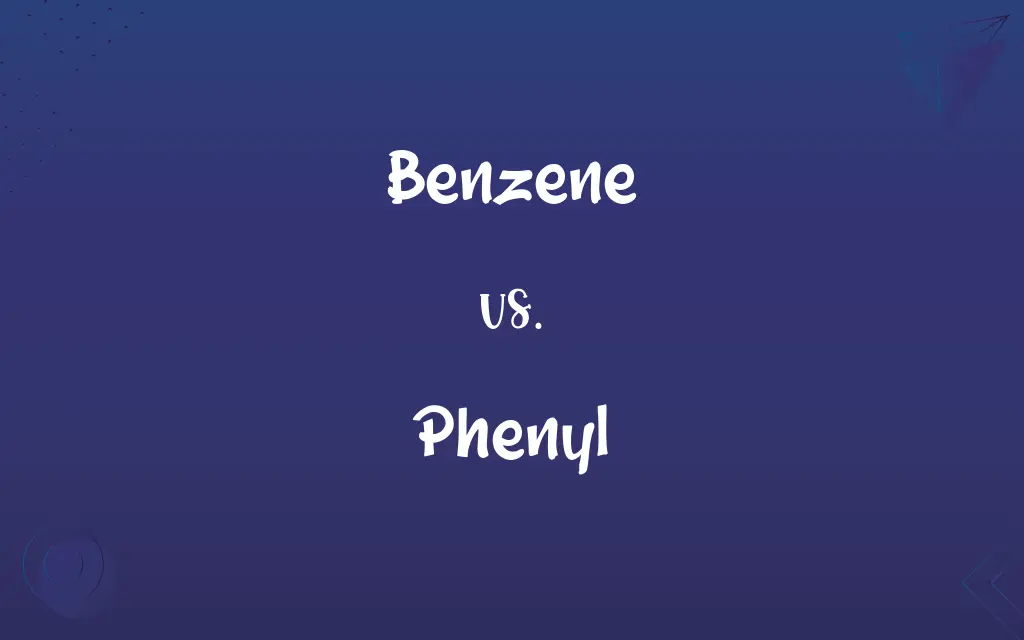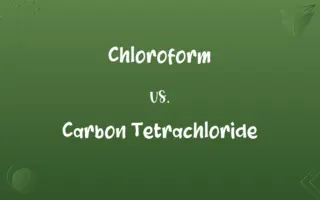Benzene vs. Phenyl: Know the Difference

By Shumaila Saeed || Published on January 2, 2024
Benzene is an aromatic hydrocarbon with a ring of six carbon atoms, while phenyl is a functional group derived from benzene by removing one hydrogen atom.

Key Differences
Benzene, C6H6, is a simple aromatic hydrocarbon known for its ring structure composed of six carbon atoms, each bonded to one hydrogen atom. Phenyl, on the other hand, is a functional group, C6H5, derived from benzene by removing one hydrogen atom, used as a building block in organic chemistry.
Shumaila Saeed
Jan 02, 2024
Structurally, benzene is a planar molecule with delocalized pi electrons over the carbon atoms, creating a stable ring. Phenyl is not a standalone molecule but a substituent or part of larger molecules, retaining the aromatic ring of benzene minus one hydrogen.
Shumaila Saeed
Jan 02, 2024
In terms of reactivity, benzene undergoes substitution reactions, where its hydrogen atoms are replaced while preserving the aromatic ring. Phenyl groups, when attached to other molecules, influence the reactivity and properties of the entire molecule, often contributing to aromaticity.
Shumaila Saeed
Jan 02, 2024
Benzene is used as a solvent and a precursor in the production of various chemicals and polymers. Phenyl groups are found in a wide range of organic compounds, from pharmaceuticals to polymers, imparting unique chemical properties to these substances.
Shumaila Saeed
Jan 02, 2024
The presence of a benzene ring is central to both benzene and phenyl, but while benzene exists independently, phenyl always exists as part of a larger molecule, bonded to another atom or group.
Shumaila Saeed
Jan 02, 2024
ADVERTISEMENT
Comparison Chart
Structure
Complete, stable ring of six carbon atoms
A ring of six carbon atoms lacking one hydrogen
Shumaila Saeed
Jan 02, 2024
Standalone Molecule
Yes, can exist independently
No, always part of larger molecules
Shumaila Saeed
Jan 02, 2024
Chemical Role
Solvent, precursor for other chemicals
Influences properties of larger molecules
Shumaila Saeed
Jan 02, 2024
ADVERTISEMENT
Benzene and Phenyl Definitions
Benzene
A colorless, volatile liquid hydrocarbon with an aromatic smell.
Benzene is used as a solvent in many industrial processes.
Shumaila Saeed
Dec 15, 2023
Phenyl
A functional group in organic chemistry representing an aromatic ring.
Phenyl groups are found in many pharmaceutical drugs.
Shumaila Saeed
Dec 15, 2023
Benzene
A naturally occurring component of crude oil.
Benzene is refined from petroleum.
Shumaila Saeed
Dec 15, 2023
Phenyl
Part of larger molecules, influencing their chemical behavior.
The presence of a phenyl group can alter a compound's solubility.
Shumaila Saeed
Dec 15, 2023
Benzene
A substance used in the manufacture of plastics and synthetic fibers.
Benzene is a precursor in the production of nylon.
Shumaila Saeed
Dec 15, 2023
ADVERTISEMENT
Phenyl
A hydrocarbon group derived from benzene by removing a hydrogen atom.
The phenyl group is a common moiety in organic chemistry.
Shumaila Saeed
Dec 15, 2023
Benzene
An organic compound with a hexagonal ring structure.
The benzene ring is a key component in many organic molecules.
Shumaila Saeed
Dec 15, 2023
Phenyl
A building block in the synthesis of complex organic compounds.
Phenyl groups are integral in the synthesis of many dyes and plastics.
Shumaila Saeed
Dec 15, 2023
Benzene
A known carcinogen used in chemical synthesis.
Despite its toxicity, benzene is widely used in the chemical industry.
Shumaila Saeed
Dec 15, 2023
Phenyl
A substituent that contributes to the aromaticity of molecules.
Phenyl groups enhance the stability of certain organic molecules.
Shumaila Saeed
Dec 15, 2023
Benzene
A colorless, flammable, toxic, liquid aromatic hydrocarbon, C6H6, derived from petroleum and used in or to manufacture a wide variety of chemical products, including DDT, detergents, insecticides, and motor fuels. Also called benzol.
Shumaila Saeed
Dec 13, 2023
Phenyl
An aromatic hydrocarbon unit, C6H5, that can occur as a substituent in an organic compound or as an ion or radical, structurally related to benzene.
Shumaila Saeed
Dec 13, 2023
Benzene
(organic compound) An aromatic hydrocarbon of formula C6H6 whose structure consists of a ring of alternate single and double bonds.
Shumaila Saeed
Dec 13, 2023
Phenyl
(organic chemistry) A univalent hydrocarbon radical (C6H5) formally derived from benzene by the removal of a hydrogen atom, and the basis of an immense number of aromatic derivatives.
Shumaila Saeed
Dec 13, 2023
Phenyl
A hydrocarbon radical (C6H5) regarded as the essential residue of benzene, and the basis of an immense number of aromatic derivatives.
Shumaila Saeed
Dec 13, 2023
Benzene
A volatile, very inflammable liquid, C6H6, contained in the naphtha produced by the destructive distillation of coal, from which it is separated by fractional distillation. The name is sometimes applied also to the impure commercial product or benzole, and also, but rarely, to a similar mixed product of petroleum.
Shumaila Saeed
Dec 13, 2023
Benzene
A colorless liquid hydrocarbon; highly inflammable; carcinogenic; the simplest of the aromatic compounds
Shumaila Saeed
Dec 13, 2023
Repeatedly Asked Queries
Is benzene a solid or liquid at room temperature?
A colorless, volatile liquid.
Shumaila Saeed
Jan 02, 2024
What is a phenyl group?
A functional group derived from benzene, lacking one hydrogen.
Shumaila Saeed
Jan 02, 2024
What properties does a phenyl group impart to a molecule?
It can influence the molecule's reactivity, stability, and solubility.
Shumaila Saeed
Jan 02, 2024
How is benzene used industrially?
As a solvent and a precursor in chemical and polymer production.
Shumaila Saeed
Jan 02, 2024
What are the health hazards associated with Benzene exposure?
Benzene exposure is linked to various health issues, including cancer, leukemia, and nervous system disorders.
Shumaila Saeed
Jan 02, 2024
What is benzene?
A volatile, aromatic hydrocarbon with a hexagonal ring structure.
Shumaila Saeed
Jan 02, 2024
Is Benzene used in the production of gasoline?
Yes, it was once used as an octane booster in gasoline, but its use has been reduced due to health concerns.
Shumaila Saeed
Jan 02, 2024
Is Phenyl used in the synthesis of pharmaceuticals?
The phenyl group is often used as a structural component in the synthesis of pharmaceutical compounds.
Shumaila Saeed
Jan 02, 2024
Can Phenyl compounds be found in fragrances and perfumes?
Yes, compounds containing the phenyl group can be used to create aromatic scents in fragrances and perfumes.
Shumaila Saeed
Jan 02, 2024
Is Phenyl commonly used in the food industry?
Phenyl compounds are not typically used in the food industry, but they can be found in some food additives and flavorings.
Shumaila Saeed
Jan 02, 2024
Is Phenyl used in organic chemistry reactions?
Yes, the phenyl group is commonly used in various organic chemistry reactions as a substituent or functional group.
Shumaila Saeed
Jan 02, 2024
Is Benzene volatile and flammable?
Yes, benzene is highly volatile and flammable, and it should be handled with extreme caution.
Shumaila Saeed
Jan 02, 2024
Is Benzene used in the pharmaceutical industry?
Benzene is not typically used in pharmaceuticals due to its toxicity, but it may be used as a solvent in some research applications.
Shumaila Saeed
Jan 02, 2024
Is Phenyl toxic or flammable?
The phenyl group itself is not inherently toxic or flammable, but the properties of compounds containing it can vary widely.
Shumaila Saeed
Jan 02, 2024
Are Phenyl compounds stable and non-reactive?
The reactivity of phenyl compounds can vary depending on their structure and chemical environment, so they may or may not be stable and non-reactive.
Shumaila Saeed
Jan 02, 2024
Share this page
Link for your blog / website
HTML
Link to share via messenger
About Author
Written by
Shumaila SaeedShumaila Saeed, an expert content creator with 6 years of experience, specializes in distilling complex topics into easily digestible comparisons, shining a light on the nuances that both inform and educate readers with clarity and accuracy.









































































